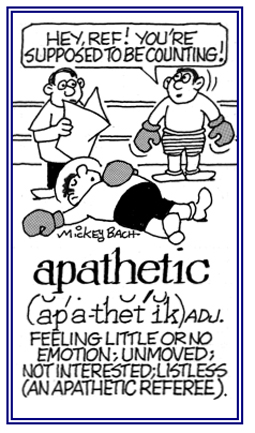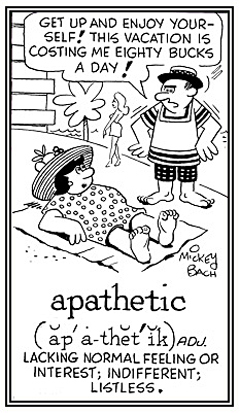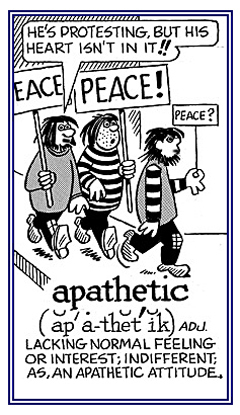a-, an-
(Greek: prefix; no, absence of, without, lack of; not)
These prefixes are normally used with elements of Greek origin, a- is used before consonants and an- is used before vowels.
It affects the meanings of hundreds of words.
There are too many words that use these prefix elements to list all of them on this site; however, there are significant examples listed in this and the other units where they exist.
A drug or substance that leads to the loss of appetite or a diminished appetite: Since he was overeating to a life-threatening degree, the doctor prescribed an anorexiant to suppress his excessive desire for food.
anorthographic (adjective), more anorthographic, most anorthographic
1. A descriptive term for the loss of the ability to write correctly: Dr. McMahon, the professor, presented examples of anorthographic spelling by combining letters that did not represent the sounds which follow the accepted rules or forms of normal words.
2. A reference to creative or imaginative spelling, in variance with the accepted rules for spelling: The local author was noted for her anorthographic approach to forming words with letter combinations that did not go along with the principles underlying accepted usage.
2. A reference to creative or imaginative spelling, in variance with the accepted rules for spelling: The local author was noted for her anorthographic approach to forming words with letter combinations that did not go along with the principles underlying accepted usage.
The absence of the ability to write correctly, resulting from injury to the language center in the cerebral cortex of the brain: After her head injury, Judy suffered from anorthography and was unable to write properly.
Being without correct vision or having distorted vision in which straight lines appear as curves or angles, and symmetry is incorrectly perceived: Dr. Smith, the ophthalmologist, was monitoring the anorthopia of the patient who described a badly formed view of curved and straight lines.
The loss or absence of the sense of smell or a decreased ability to smell foods: The famous chef was very concerned when he was given a diagnosis of anosmia gustatoria because his profession depended on his ability to smell as well as to taste.
Ignorance of having a disease: Robert's aunt's anosognosia was finally diagnosed by her physician who made her aware that she had Parkinson's disease.
Congenital absence of one or both external parts of the ears that catch sound waves and transmit them into the external sound canals that go to the eardrums: Lucy wore her hair combed to the left to cover the anotia of her left ear.
Absence of oxygen in arterial blood: Paula was having breathing problems and the emergency medical personnel recognized it as severe anoxemia; so, they started to administer oxygen to her.
The absence or deficiency of oxygen from the body's gases, blood, or tissues: Ed was told that if his anoxia continues for more than four to six minutes, he could have irreversible brain damage.
1. Frogs and toads, all of which have no tail: The woman's father drove his car slowly as he was trying to miss the many anurans that were jumping across the road during the rain storm.
2. Etymology: from Latin Anura, order of frogs and toads from an-, "without" + Greek oura, "tail".
2. Etymology: from Latin Anura, order of frogs and toads from an-, "without" + Greek oura, "tail".
The absence of urine formation by the kidneys: Ned's anuria was of concern to the doctor who feared there could be an infection in the bladder if he could not pass urine.
anuric (adjective), more anuric, most anuric
Descriptive of a condition in which the patient is unable to generate or to pass urine: Glen's anuric condition was getting worse; so, he was admitted to the hospital in hopes of finding a way so he would be able to urinate when he needed to do it.
apancreatic (adjective) (not comparable)
A reference to something that is caused by the absence of the pancreas: As a result of a critical operation to remove the diseased pancreas, Polly was medically in an apancreatic condition and required daily insulin and careful medical monitoring.
aparalytic (adjective), more aparalytic, most aparalytic
Descriptive of a physical condition that is without paralysis or that which does not cause paralysis: After such a severe automobile accident, the fact that Viola survived in an aparalytic condition was considered to be a miracle.
apathetic (ap" uh THET ik) (adjective), more apathetic, most apathetic
1. Relating to a lack of emotion or a reduced level of activity: Dr. Diedrich thought that Nora's apathetic behavior was the beginning of a significant form of depression.
2. Descriptive of a lack of interest and having no concern about something or someone: The apathetic turnout at the election suggested that the voters were unconcerned about the reelection of the mayor.

© ALL rights are reserved.

© ALL rights are reserved.

© ALL rights are reserved.
Go to this Word A Day Revisited Index
2. Descriptive of a lack of interest and having no concern about something or someone: The apathetic turnout at the election suggested that the voters were unconcerned about the reelection of the mayor.





